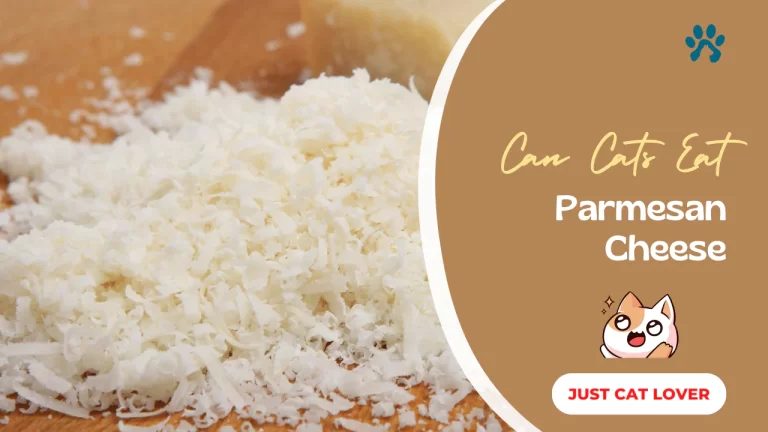Parmesan cheese is a hard, aged cheese that originated in Italy. It has a strong and nutty flavor that many people enjoy. But can cats eat parmesan cheese?
The short answer is yes, but only in very small amounts and occasionally. Parmesan cheese is not toxic to cats, but it is not a healthy or necessary part of their diet either.
In this article, we will explore the nutritional value, possible health benefits, and potential health risks of eating parmesan cheese for cats. We will also provide some tips on how to safely feed your cat parmesan cheese if you choose to do so.
Nutritional Value of Parmesan Cheese
Parmesan cheese is high in protein, calcium, phosphorus, and vitamin A. These are all important nutrients for cats, especially for their bones, teeth, muscles, and vision. However, parmesan cheese also contains a lot of fat, sodium, and lactose.
These are not good for cats in large amounts, as they can cause obesity, high blood pressure, dehydration, and digestive problems. One ounce (28 grams) of parmesan cheese contains about 120 calories, 8 grams of fat, 5 grams of saturated fat, 90 milligrams of sodium, and less than 1 milligram of lactose.
Possible Health Benefits of Eating Parmesan Cheese
Some studies have suggested that parmesan cheese may have some health benefits for humans, such as lowering blood pressure, improving bone density, and preventing tooth decay. However, these effects have not been proven in cats, and they may not outweigh the potential risks of eating too much cheese. Moreover, cats can get these benefits from other sources that are more suitable for their dietary needs.
Potential Health Risks of Eating Parmesan Cheese
The main risk of eating parmesan cheese for cats is lactose intolerance. Most adult cats are lactose intolerant, which means they lack the enzyme lactase to digest the milk sugar lactose. When lactose-intolerant cats consume dairy products like cheese, they may experience diarrhea, vomiting, gas, bloating, and abdominal pain. These symptoms can lead to dehydration and electrolyte imbalance if left untreated.
Another risk of eating parmesan cheese for cats is obesity. Cheese is a high-calorie food that can easily add up to your cat’s daily energy intake. If your cat eats too much cheese and does not exercise enough, they may gain weight and develop obesity-related health problems such as diabetes, arthritis, heart disease, and liver disease.
A third risk of eating parmesan cheese for cats is sodium toxicity. Cheese is a high-sodium food that can increase your cat’s blood pressure and strain their kidneys. Excessive sodium intake can also cause thirst, urination, dehydration, seizures, coma, and death in severe cases.
Is Parmesan Cheese Safe for Cats?
Parmesan cheese is not toxic to cats, but it is not a healthy or necessary part of their diet either. Cats do not need cheese to meet their nutritional requirements, and they may suffer from digestive issues or other health problems if they eat too much cheese. Therefore, it is best to limit your cat’s intake of parmesan cheese to occasional treats or avoid it altogether.
How Much Parmesan Cheese Can Cats Eat?
If you decide to give your cat parmesan cheese as a treat, you should follow some guidelines to ensure their safety and well-being. Here are some tips on how to feed your cat parmesan cheese:
- Check with your veterinarian before giving your cat any new food or treat. Your vet can advise you on whether your cat can tolerate cheese and how much they can have.
- Choose plain parmesan cheese without any added flavors or ingredients that may be harmful to your cat.
- Grate or shred the cheese into small pieces that are easy for your cat to chew and swallow.
- Give your cat no more than one teaspoon (5 grams) of parmesan cheese per day. This amount should make up no more than 10% of your cat’s daily calorie intake.
- Monitor your cat for any signs of lactose intolerance or other adverse reactions after eating cheese. If you notice any symptoms such as diarrhea, vomiting, gas, bloating, or abdominal pain, stop giving your cat cheese and contact your vet immediately.
- Provide your cat with plenty of fresh water to prevent dehydration and flush out excess sodium from their system.
- Balance your cat’s diet with high-quality cat food that meets their nutritional needs and preferences.
Parmesan cheese can be a tasty treat for some cats, but it is not a staple food for them. Cats can eat parmesan cheese in moderation and under supervision if they are not lactose intolerant or allergic to it. However, too much cheese can cause health problems for cats such as obesity, high blood pressure, and sodium toxicity. Therefore, it is better to limit your cat’s intake of cheese or avoid it altogether. Instead, you can offer your cat other healthy and cat-friendly treats that they will enjoy and benefit from.







